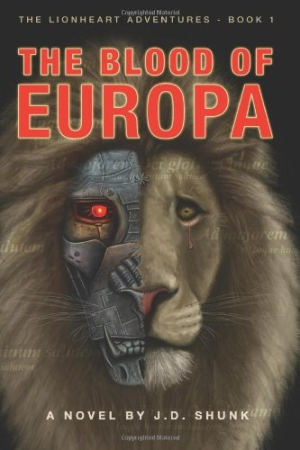
The Blood of Europa
This Christian sci-fi debut brims with complex twists and turns as Shunk imagines a dystopia that will enthrall readers.
Readers are propelled nearly half a millennium into the future in The Blood of Europa, the debut novel from J D Shunk. Using contemporary concerns as a jumping-off point, Shunk presents a possible universe in which resources are scarce, governments are totalitarian, and godlessness rules—that is, if two visitors from 2013 can’t help to turn things around.
Matthew Lionheart and James Mustang are childhood friends brought together by desperate circumstances. While they are standing off against two mercenaries, a fought-over briefcase bursts open and releases a time-bridging vortex. All four men are sucked into the year 2499, and the commandeered case becomes their only hope for returning home.
Shunk’s imagined future isn’t bright: little water remains on Earth, and a unifying government called the State metes out supplies to a dying population. Worse, just outside of Earth’s atmosphere, a vicious army is poised to go to war with Europa, the universe’s one remaining source of pure and nearly limitless water. All that stands between the conniving State army and universal tyranny are the half-machine, half-animal inhabitants of Europa and a noble Martian called Mia.
While Lionheart’s inner thoughts suggest deep mistrust of Mia, a romance between them brews quietly. Shunk foreshadows their relationship well, even if the headstrong and world-weary Mia seems an unlikely match for coddled Lionheart.
Other characters and situations are also unobtrusively well-developed, with readers made privy to the political and social circumstances of the residents of Europa even as they’re given hints of how today’s mistakes led to this potential future. A fast pace, gripping battles, and a number of complex villains ensure a rapt audience.
The author is guilty of a degree of bait-and-switch when issues related to religion arise. Though categorized as a Christian book, God is absent well through a hundred pages, until Lionheart’s shelved faith finds itself suddenly called down for a good dusting-off.
Religious discussions take up only a few pages overall, and these become space mostly for shaky testimonials to surprisingly malleable listeners. Shunk’s future is one in which the idea of God is dead, but only by twenty years, and courtesy of a singular, remarkably efficient fatal blow. Still, for Mia, sophisticated and accepted scientific proofs against God are undone quickly via Lionheart’s rudimentary articulations of what faith means and provides.
These passages are confusing in an otherwise well-constructed dystopia. The dual act of rendering faith and science wholly incompatible while allowing a practical leader to be swayed toward faith based on partial arguments leads to the least believable moments of a novel otherwise packed with wild and engaging imaginative writing.
But these flaws occupy small corners in a novel otherwise brimming with complex twists and turns. Shunk’s characterizations are full-bodied, and the universe he imagines is laden with wonders worth exploring. This book is a thrilling contribution to Christian science fiction, poised to enthrall young adult audiences.
Reviewed by
Michelle Anne Schingler
Disclosure: This article is not an endorsement, but a review. The publisher of this book provided free copies of the book and paid a small fee to have their book reviewed by a professional reviewer. Foreword Reviews and Clarion Reviews make no guarantee that the publisher will receive a positive review. Foreword Magazine, Inc. is disclosing this in accordance with the Federal Trade Commission’s 16 CFR, Part 255.
